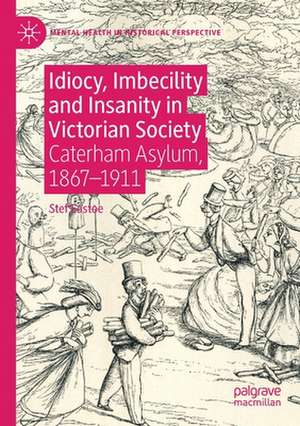Idiocy, Imbecility and Insanity in Victorian Society: Caterham Asylum, 1867–1911: Mental Health in Historical Perspective
Autor Stef Eastoeen Limba Engleză Paperback – 26 aug 2021
| Toate formatele și edițiile | Preț | Express |
|---|---|---|
| Paperback (1) | 523.54 lei 6-8 săpt. | |
| Springer International Publishing – 26 aug 2021 | 523.54 lei 6-8 săpt. | |
| Hardback (1) | 527.79 lei 6-8 săpt. | |
| Springer International Publishing – 20 feb 2020 | 527.79 lei 6-8 săpt. |
Din seria Mental Health in Historical Perspective
-
 Preț: 282.24 lei
Preț: 282.24 lei - 17%
 Preț: 364.29 lei
Preț: 364.29 lei -
 Preț: 202.93 lei
Preț: 202.93 lei -
 Preț: 148.04 lei
Preț: 148.04 lei -
 Preț: 458.78 lei
Preț: 458.78 lei - 15%
 Preț: 640.24 lei
Preț: 640.24 lei - 18%
 Preț: 727.66 lei
Preț: 727.66 lei -
 Preț: 226.07 lei
Preț: 226.07 lei -
 Preț: 346.86 lei
Preț: 346.86 lei -
 Preț: 213.97 lei
Preț: 213.97 lei - 18%
 Preț: 787.47 lei
Preț: 787.47 lei - 15%
 Preț: 446.60 lei
Preț: 446.60 lei - 18%
 Preț: 889.75 lei
Preț: 889.75 lei - 15%
 Preț: 524.22 lei
Preț: 524.22 lei - 18%
 Preț: 786.18 lei
Preț: 786.18 lei -
 Preț: 233.40 lei
Preț: 233.40 lei -
 Preț: 417.90 lei
Preț: 417.90 lei - 15%
 Preț: 701.40 lei
Preț: 701.40 lei - 15%
 Preț: 523.72 lei
Preț: 523.72 lei - 18%
 Preț: 894.34 lei
Preț: 894.34 lei - 15%
 Preț: 504.99 lei
Preț: 504.99 lei - 15%
 Preț: 640.24 lei
Preț: 640.24 lei - 15%
 Preț: 706.30 lei
Preț: 706.30 lei - 15%
 Preț: 576.21 lei
Preț: 576.21 lei - 5%
 Preț: 158.80 lei
Preț: 158.80 lei -
 Preț: 319.98 lei
Preț: 319.98 lei -
 Preț: 227.42 lei
Preț: 227.42 lei
Preț: 523.54 lei
Preț vechi: 615.93 lei
-15% Nou
Puncte Express: 785
Preț estimativ în valută:
100.18€ • 104.97$ • 82.82£
100.18€ • 104.97$ • 82.82£
Carte tipărită la comandă
Livrare economică 11-25 aprilie
Preluare comenzi: 021 569.72.76
Specificații
ISBN-13: 9783030273378
ISBN-10: 3030273377
Pagini: 212
Ilustrații: XVII, 212 p. 15 illus.
Dimensiuni: 148 x 210 x 22 mm
Greutate: 0.31 kg
Ediția:1st ed. 2020
Editura: Springer International Publishing
Colecția Palgrave Macmillan
Seria Mental Health in Historical Perspective
Locul publicării:Cham, Switzerland
ISBN-10: 3030273377
Pagini: 212
Ilustrații: XVII, 212 p. 15 illus.
Dimensiuni: 148 x 210 x 22 mm
Greutate: 0.31 kg
Ediția:1st ed. 2020
Editura: Springer International Publishing
Colecția Palgrave Macmillan
Seria Mental Health in Historical Perspective
Locul publicării:Cham, Switzerland
Cuprins
Chapter 1: Introduction and the Roots of Caterham.- Chapter 2: Creating Caterham.- Chapter 3: Populating Caterham.- Chapter 4: Experiencing Caterham.- Chapter 5: Visualising Idiocy, Visualising Caterham.- Chapter 6: Geographies of Idiocy.- Chapter 7: Conclusion.
Recenzii
“Eastoe has produced a thoughtful, generous, and rich monograph that is well informed and deserves a wide readership beyond the academy. Above all, she raises important questions around how health and welfare systems approach the blurred divisions between acute and long-term care, which are as relevant today as they were in the nineteenth century.” (Louise Hide, Victorian Studies, Vol. 64 (3), 2022)
“Idiocy, Imbecility and Insanity in Victorian Society starts with a stated goal to challenge works that emphasize narratives of repression and violence in the asylum. This is grounded in a both a desire to find the complexity of the patient experience and in the fact that the records do not record much explicit abuse at Caterham.” (Amy Milne-Smith, Journal of British Studies, Vol. 60 (2), April, 2021)
“Idiocy, Imbecility and Insanity in Victorian Society starts with a stated goal to challenge works that emphasize narratives of repression and violence in the asylum. This is grounded in a both a desire to find the complexity of the patient experience and in the fact that the records do not record much explicit abuse at Caterham.” (Amy Milne-Smith, Journal of British Studies, Vol. 60 (2), April, 2021)
Notă biografică
Stef Eastoe is a social and cultural historian, who has taught courses on the social history of medicine at several British universities. She specializes in the history of idiocy, welfare, and Victorian institutions, and has had work published in Journal of Victorian Culture and Landscape Research.
Textul de pe ultima copertă
This book explores the understudied history of the so-called ‘incurables’ in the Victorian period, the people identified as idiots, imbeciles and the weak-minded, as opposed to those thought to have curable conditions. It focuses on Caterham, England’s first state imbecile asylum, and analyses its founding, purpose, character, and most importantly, its residents, innovatively recreating the biographies of these people. Created to relieve pressure on London’s overcrowded workhouses, Caterham opened in September 1870. It was originally intended as a long-stay institution for the chronic and incurable insane paupers of the metropolis, more commonly referred to as idiots and imbeciles. This purpose instantly differentiates Caterham from the more familiar, and more researched, lunatic asylums, which were predicated on the notion of cure and restoration of the senses. Indeed Caterham, built following the welfare and sanitary reforms of the late 1860s, was an important feature of the Victorian institutional landscape, and it represented a shift in social, medical and political responsibility towards the care and management of idiot and imbecile paupers.
Caracteristici
Explores the understudied histories of asylum patients identified as incurably insane and how society, government and the medical profession responded to this group Focuses on the history of Caterham, England’s first state imbecile asylum, unlike other lunatic asylums where so-called curable patients were treated Challenges the notion of incurability and chronicity as sources of shame and stigma within Victorian and Edwardian economies of welfare
